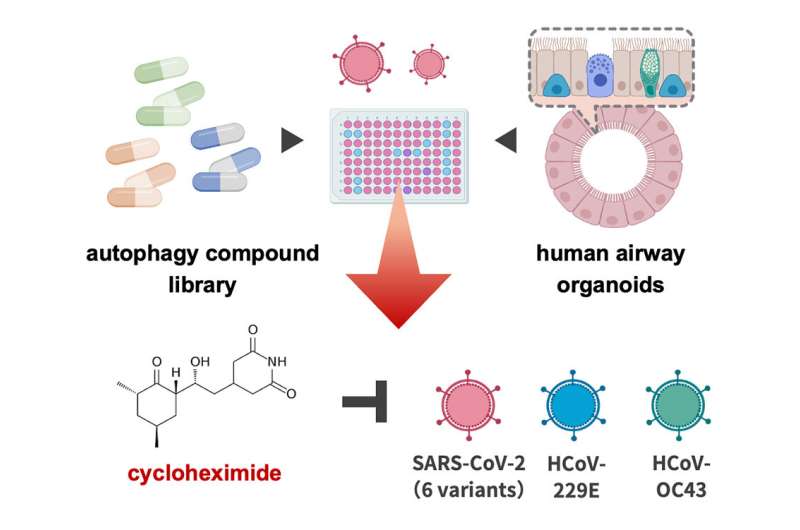This article has been reviewed according to Science X's editorial process and policies. Editors have highlighted the following attributes while ensuring the content's credibility:
fact-checked
peer-reviewed publication
trusted source
proofread
Autophagy-related compound screening for the development of COVID-19 therapeutics

Junior Associate Professor Kazuo Takayama and his research team used human airway organoids to screen autophagy-related compounds and found cycloheximide and thapsigargin to show strong antiviral effects against SARS-CoV-2. Further testing revealed cycloheximide to be also effective against six SARS-CoV-2 mutant strains and other human coronaviruses. Results of this study were published online in Molecular Pharmaceutics on March 22, 2023.
Targeting host proteins involved in viral infections is an effective approach for dealing with viruses that mutate rapidly to produce new strains one after another. In this study, the scientists attempted to find COVID-19 therapeutic agents by focusing on autophagy. Autophagy is known to be closely involved with infection by SARS-CoV-2 and its elimination, thus making autophagy-related compounds potential COVID-19 therapeutic candidates.
The research team screened a library of autophagy-related compounds with airway organoids to identify compounds that could control SARS-CoV-2 infection. From the 80 compounds tested, they found cycloheximide and thapsigargin to reduce infection efficiency in a dose-dependent manner.
Because cycloheximide showed greater antiviral efficacy than thapsigargin, they further examined cycloheximide in detail. Cycloheximide also exhibited antiviral activity against six SARS-CoV-2 mutant strains, as well as against human coronaviruses, HCoV-229E and HCoV-OC43, which suggests that cycloheximide has broad-spectrum anti-coronavirus activity. On the other hand, the researchers observed significant toxicity caused by cycloheximide in animal experiments due to its function as a protein synthesis inhibitor.
Takayama believes less toxic derivatives or analogous compounds of cycloheximide that retain their antiviral effects hold great promise if developed in the future. In this study, the team demonstrated the feasibility of drug screening using human airway organoids, thus hinting at the possibility of combining the method with much larger compound libraries for more extensive COVID-19 therapeutic drug discovery.
More information: Rina Hashimoto et al, Evaluation of Broad Anti-Coronavirus Activity of Autophagy-Related Compounds Using Human Airway Organoids, Molecular Pharmaceutics (2023). DOI: 10.1021/acs.molpharmaceut.3c00114
Journal information: Molecular Pharmaceutics
Provided by Kyoto University




















